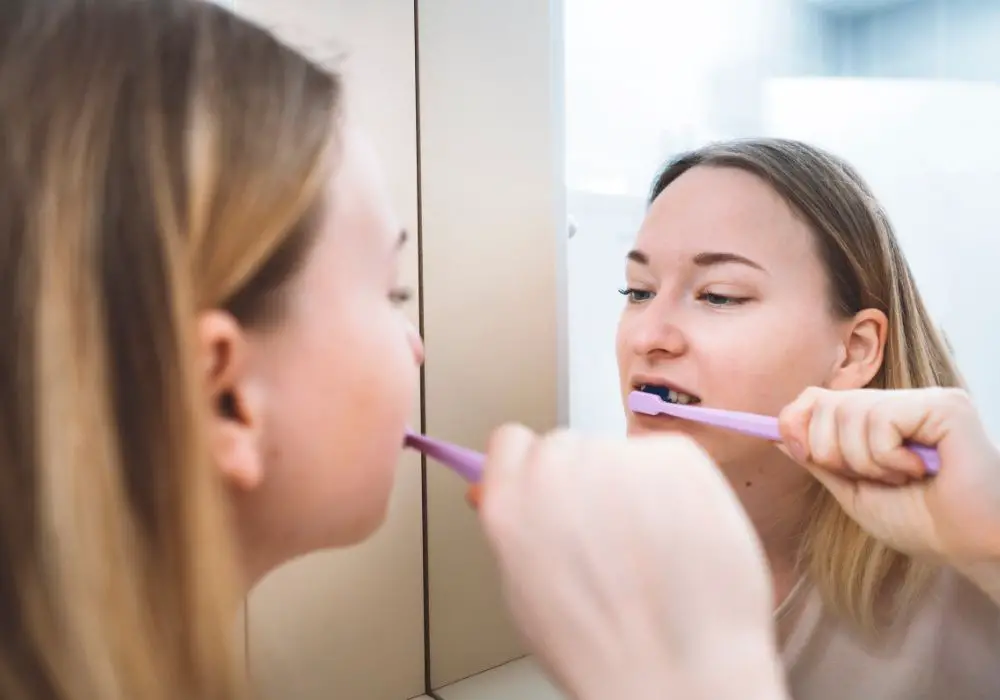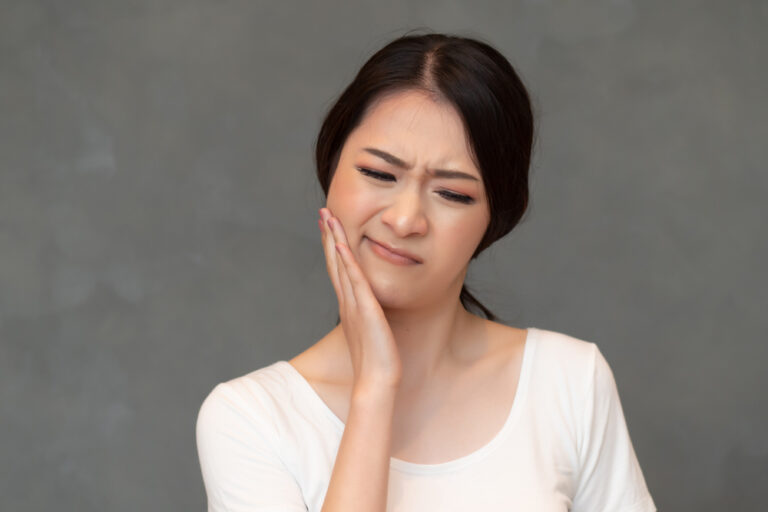When you’re feeling under the weather, it can be challenging to maintain your oral health routine, especially when it comes to brushing your teeth. But skipping your brushing routine can lead to more significant dental problems in the long run. So, how do you brush your teeth when you have the flu?
Firstly, it’s essential to practice good hygiene habits when you’re sick. Cover your mouth when you cough or sneeze to prevent germs from spreading, and don’t forget to keep up with your dental and toothbrush hygiene. According to the CDC, the flu virus can live on moist surfaces for up to 72 hours, so it’s crucial to keep your toothbrush clean.
Secondly, even if you’re feeling weak, try to brush your teeth at least once a day. Brushing your teeth will help keep your mouth clean, and it might even help you feel a bit more refreshed. If you can’t manage to brush your teeth twice a day, aim to brush at least once a day. Remember to use a soft-bristled toothbrush and be gentle on your gums.
Understanding the Flu and Oral Hygiene

When you have the flu, it’s important to take extra care of your oral hygiene. The flu is a contagious respiratory illness caused by influenza viruses that can spread through droplets when an infected person talks, coughs, or sneezes. It can also spread by touching a surface contaminated with the virus and then touching your mouth, nose, or eyes.
Maintaining good oral hygiene can help reduce the risk of spreading the flu virus. Here are some tips to keep in mind:
- Wash your hands frequently with soap and water or use an alcohol-based hand sanitizer to help prevent the spread of germs.
- Avoid sharing toothbrushes, cups, or utensils with others to prevent the spread of germs.
- Use disposable tissues to cover your mouth and nose when you cough or sneeze, and dispose of them properly.
- Clean and disinfect surfaces that may be contaminated with the flu virus, such as doorknobs, light switches, and countertops.
In addition to these general hygiene practices, it’s important to take care of your oral health when you have the flu. The flu can cause dehydration, which can lead to dry mouth and increase the risk of tooth decay and gum disease. Here are some tips to help maintain good oral hygiene:
- Brush your teeth twice a day with fluoride toothpaste to help remove plaque and prevent tooth decay.
- Use a soft-bristled toothbrush and brush gently to avoid irritating your gums.
- Floss daily to remove plaque and food particles from between your teeth and under your gumline.
- Rinse your mouth with water or mouthwash to help remove bacteria and freshen your breath.
- Drink plenty of water to stay hydrated and help prevent dry mouth.
By following these tips, you can help maintain good oral hygiene and reduce the risk of spreading the flu virus. Remember to consult with your healthcare provider if you are experiencing flu-like symptoms or have any concerns about your oral health.
Importance of Brushing When Sick
When you’re sick with the flu, brushing your teeth may be the last thing on your mind. However, maintaining good oral hygiene is essential for your overall health. Here are a few reasons why brushing your teeth is important when you’re sick:
Fighting Germs
When you have the flu, the virus can live on moist surfaces for up to 72 hours according to the CDC. This means that the virus can live on your toothbrush and in your mouth for several days. Brushing your teeth regularly helps to remove the virus from your mouth and prevent it from spreading to others.
Preventing Complications
If you don’t brush your teeth regularly while you’re sick, you may be at risk for developing complications such as gum disease and tooth decay. The bacteria and viruses in your mouth can cause inflammation and damage to your teeth and gums, which can lead to more serious dental problems in the future.
To keep your mouth healthy while you’re sick, here are a few tips:
- Brush your teeth at least twice a day with fluoride toothpaste.
- Use an alcohol-free mouthwash to kill germs and freshen your breath.
- Replace your toothbrush every three to four months, or sooner if the bristles become frayed or worn.
- If you have a fever, wait until your temperature returns to normal before brushing your teeth to avoid spreading germs.
- Wash your hands before and after brushing your teeth to prevent the spread of germs.
By taking these steps, you can help protect your oral health and prevent the spread of germs while you’re sick with the flu.
Choosing the Right Oral Care Products

When you have the flu, taking care of your oral hygiene is crucial. Here are some tips on choosing the right oral care products to help you maintain good oral health:
Toothpaste Selection
Choosing the right toothpaste can help you fight against the flu virus. Look for toothpaste that contains fluoride, which can help prevent tooth decay and strengthen your tooth enamel. You may also want to consider toothpaste that contains antiviral ingredients, such as zinc or hydrogen peroxide, to help kill germs and viruses.
When selecting toothpaste, consider the following:
- Fluoride content: Look for toothpaste that contains at least 1,000 parts per million (ppm) of fluoride.
- Antiviral properties: Consider toothpaste that contains antiviral ingredients, such as zinc or hydrogen peroxide.
- Sensitivity: If you have sensitive teeth, consider toothpaste that is designed for sensitive teeth.
Mouthwash Use
Mouthwash can help kill germs and bacteria in your mouth, which can help prevent the spread of the flu virus. Look for mouthwash that contains antiviral ingredients, such as alcohol or chlorhexidine, to help kill germs and viruses.
When using mouthwash, consider the following:
- Alcohol content: Look for mouthwash that contains at least 20% alcohol, which can help kill germs and viruses.
- Chlorhexidine content: Consider mouthwash that contains chlorhexidine, which can help kill germs and viruses.
- Sensitivity: If you have sensitive gums, consider using mouthwash that is designed for sensitive gums.
By choosing the right oral care products, you can help fight against the flu virus and maintain good oral health. Remember to brush your teeth twice a day, floss regularly, and use mouthwash to help prevent the spread of germs and viruses.
Proper Brushing Technique When Ill
When you have the flu, brushing your teeth may feel like a daunting task. However, maintaining good oral hygiene is crucial to avoid further health complications. Here are some tips for proper brushing technique when ill:
- Use a soft-bristled toothbrush to avoid irritating your gums.
- Brush your teeth gently to avoid causing discomfort to your mouth.
- Rinse your toothbrush with hot water before and after brushing to kill any germs.
- Use an alcohol-free mouthwash to kill bacteria and freshen your breath.
- Replace your toothbrush after you’ve recovered from the flu to avoid reinfection.
Remember, brushing your teeth is an important part of overall health and wellness, especially when you’re feeling under the weather. By following these simple tips, you can maintain good oral hygiene and stay healthy even when you’re ill.
Caring for Your Toothbrush Post-Illness

When you’re recovering from the flu, it’s important to take extra care of your toothbrush to prevent the spread of germs. Here are some tips to help you care for your toothbrush post-illness:
- Replace your toothbrush: After you’ve been sick, it’s a good idea to replace your toothbrush, especially if you’ve had it for more than three months. This will help prevent the spread of germs and keep your mouth healthy.
- Sanitize your toothbrush: If you don’t want to replace your toothbrush, you can sanitize it by soaking it in mouthwash or a mixture of water and hydrogen peroxide for a few minutes. You can also run it through the dishwasher or boil it in water for a few minutes.
- Store your toothbrush properly: After you’ve sanitized your toothbrush, make sure you store it in a clean, dry place where it can air dry. Avoid storing it in a closed container or covering it with a cap, as this can create a moist environment where bacteria can grow.
- Don’t share your toothbrush: It’s important to never share your toothbrush, especially when you’re sick. This can spread germs and increase the risk of getting sick again.
By taking these simple steps, you can help keep your toothbrush clean and prevent the spread of germs after an illness.
Additional Oral Care Tips While Sick
When you are sick with the flu, it can be challenging to maintain good oral hygiene. However, it is essential to take care of your teeth and gums, especially when you are not feeling well. Here are some additional oral care tips to follow when you have the flu.
Hydration and Its Benefits
Drinking plenty of fluids is crucial when you are sick with the flu. It helps to keep your body hydrated and flushes out toxins. Additionally, staying hydrated can also benefit your oral health. When you drink water, it helps to wash away bacteria and food particles that can lead to tooth decay and gum disease.
You can also try drinking warm fluids like tea or broth, which can help soothe a sore throat and provide relief from congestion. However, be sure to avoid sugary drinks like soda or sports drinks, as they can contribute to tooth decay.
Avoiding Certain Foods and Drinks
When you are sick with the flu, it is best to avoid certain foods and drinks that can worsen your symptoms or harm your oral health. Here are some examples:
- Sugary or acidic foods: These can contribute to tooth decay and erosion, respectively. Instead, choose healthier options like fruits and vegetables.
- Alcohol: This can dehydrate your body and contribute to dry mouth, which can increase the risk of tooth decay and gum disease.
- Caffeine: This can also dehydrate your body and contribute to dry mouth. If you need a pick-me-up, try drinking decaffeinated tea or water instead.
In addition to avoiding certain foods and drinks, it is also important to continue brushing and flossing regularly, even when you are not feeling well. If you find it difficult to brush your teeth, try using an alcohol-free mouthwash or chewing sugar-free gum to help freshen your breath and remove bacteria. Remember, maintaining good oral hygiene is essential for overall health and well-being, especially when you are sick with the flu.
Frequently Asked Questions
Should you brush your teeth if you are sick?
Yes, it is important to maintain good oral hygiene even when you are sick. Brushing your teeth can help remove bacteria and prevent further infections. However, be gentle while brushing and avoid brushing too hard to prevent irritating your gums.
Can you brush your teeth while having the flu?
Yes, you can brush your teeth while having the flu. However, it is important to be gentle while brushing and avoid brushing too hard to prevent irritating your gums. If you have a sore throat or mouth sores, you may want to use a soft-bristled toothbrush to make brushing more comfortable.
How do you clean your mouth when sick?
In addition to brushing your teeth, you can clean your mouth by using mouthwash or saltwater rinses. These can help reduce bacteria and soothe sore throats. Drinking plenty of water can also help keep your mouth hydrated and reduce dryness.
Can I brush my teeth if I have a cold?
Yes, you can brush your teeth if you have a cold. However, be gentle while brushing and avoid brushing too hard to prevent irritating your gums. If you have a sore throat or mouth sores, you may want to use a soft-bristled toothbrush to make brushing more comfortable.
Should you brush your teeth after vomiting?
No, it is not recommended to brush your teeth immediately after vomiting. Stomach acids can soften tooth enamel, and brushing too soon can cause further damage. Instead, rinse your mouth with water or mouthwash and wait at least 30 minutes before brushing your teeth.
Should you brush your teeth after whitening strips?
Yes, it is recommended to brush your teeth after using whitening strips to remove any remaining gel and prevent tooth sensitivity. However, be gentle while brushing and avoid brushing too hard to prevent irritating your gums.







